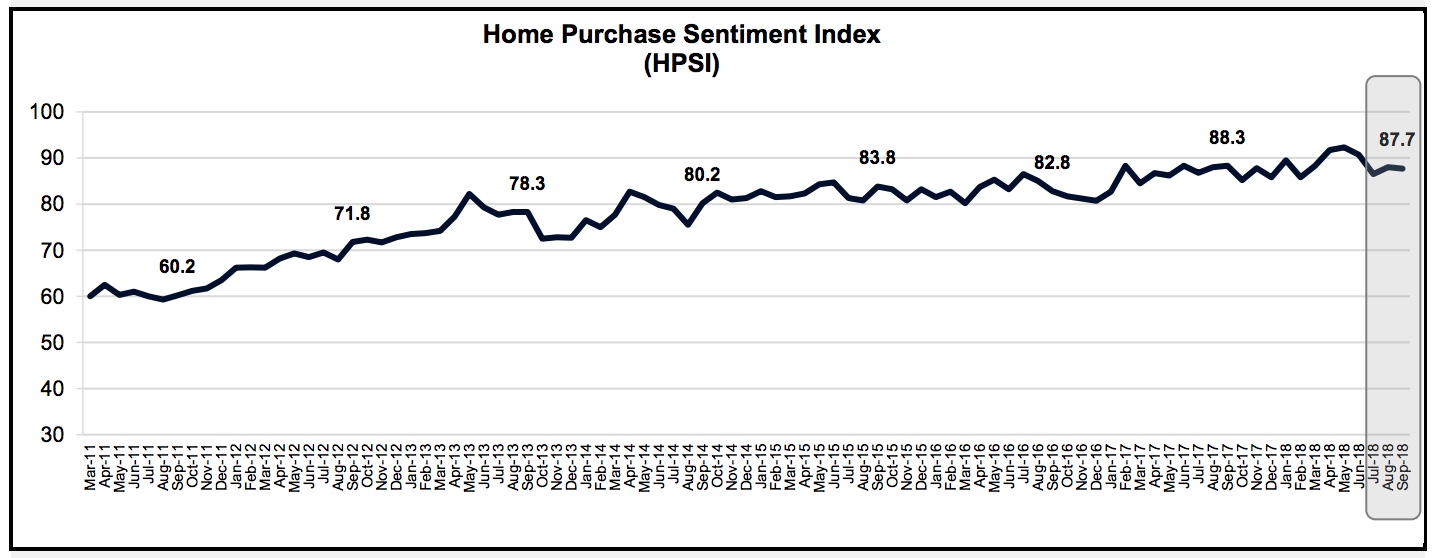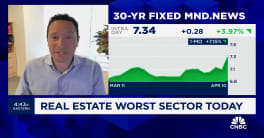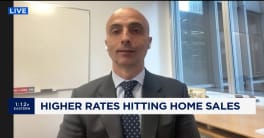It appears that, while Americans are generally upbeat about the economy, housing, and their own financial fortunes, they have a little difficulty maintaining those sentiments. Fannie Mae said today that its Home Purchase Sentiment Index (HPSI) reversed direction again in September, falling 0.3 point to 87.7. The downturn did not erase the strong August results; the index gained 1.5 points, recovering from two straight months of loss.

The September HPSI, which is based on some responses to Fannie Mae's National Housing Survey (NHS), dipped because of declines in three of its six components including the two reflecting sentiment about personal finances. However, the question about whether it was a good time to buy a home had net positive responses (the net is positive responses minus negative ones) that jumped 5 percentage points, bouncing off a survey low of 21 percent. That component dropped 3 points in August and an aggregate of 11 points since March. The companion question, whether it is now a good time to sell was unchanged from September at a net of 38 percent.
The other uptick came from the NHS question about whether home prices would continue to rise over the next 12 months. While the net of yes responses rose 1 point to 39 percent, it was the third straight month that component had netted under 40 percent. It last did this at the end of 2016.
The HPSI was dragged down by a three point drop in the net number of consumers who reported their household income was significantly higher than 12 months earlier. The net positive responses in August had risen 1 point to a new survey high of 22 percent. While not a component of the index, 53 percent said they expected their income to improve over the next 12 months.
Respondents also were slightly more pessimistic about their job security, with the net who said they were confident they would not lose their jobs ticking down 1 point to 79 percent. That component had soared 15 points in August, and even with the slight dip in September only 10 percent of respondents expressed any concern about their employment.
The net share of respondents who expect mortgage rates to move lower remained even more firmly negative, dropping another 4 percentage points to -56 percent and Doug Duncan, Fannie Mae's chief economist, noted that had an impact on other results. "HPSI remains flat this month as perceptions of high home prices and expectations for rising mortgage rates continue to weigh on potential homebuyers," he said. "In September, the average 30-year fixed mortgage rate increased for the second consecutive month to 4.63 percent, its highest level since May 2011. In addition, the Federal Open Market Committee members' interest rate projections at the September meeting continued to point to four additional rate increases between now and the end of 2019. Still, downside risk to housing is limited by broader economic strength, which helped boost perceptions of current home buying conditions. For consumers who say now is a good time to buy, the share citing overall economic conditions as a reason rose to a survey high."
While they are not components of the HPSI, some other responses to the NHS are noteworthy. Sixty-six percent of respondents told pollster they planned to buy their next home, staying in the narrow 5- or 6-month range that sentiment has maintained for at least two years. Opinions that the economy is on the right track rose 4 points to 55 percent, and among those who said home prices will continue to rise, the percentage increase expected was 4.5 percent.
The Home Purchase Sentiment Index (HPSI) distills information about consumers' home purchase sentiment from six questions asked in Fannie Mae's NHS into a single number. Those questions solicit consumers' evaluations of housing market conditions and address topics that are related to their home purchase decisions.
The NHS is a monthly phone survey of approximately 1,000 households, both home owners and renters, to assess their attitudes toward owning and renting a home, home and rental price changes, homeownership distress, the economy, household finances, and overall consumer confidence. Respondents are asked more than 100 questions used to track attitudinal shifts. The survey began in June 2010. The September 2018 National Housing Survey was conducted between September 1, 2018 and September 27, 2018. Most of the data collection occurred during the first two weeks of this period. Interviews were conducted by PSB, in coordination with Fannie Mae.







